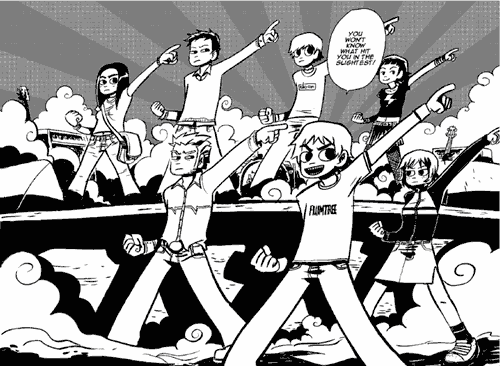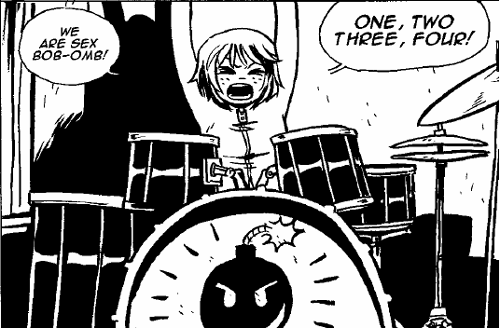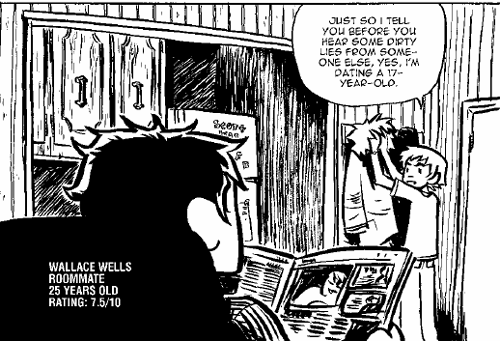I’m not very good with promises, but I’m aiming for one blog update per weekend (and I hope one during the week, but we’ll see) just to keep me going, because this has been an unexpectedly taxing autumn. To prove I can keep promises after a fashion, though, I once told Jim Henley I’d write more about my thoughts on The Filth and gender. And while I’m on a roll, I asked Graeme McMillan whether he thought Rosie in the remake of The Manchurian Candidate was a good guy, a bad guy, or neither, but I never responded with my thoughts.
Rectifying two old birds with one stone, in quasi-realistic situations (and it’s not entirely clear to me why I put The Filth in this class) we expect the good guys to avoid trading sex for information. OK, it’s entirely possible that this is just me and that the rest of the world assumes that the FBI adheres to James Bond standards of sexual involvement and intrigue, but I think not. And so in The Manchurian Candidate it set off alarms for me that Rosie was willing to become (I assume sexually) intimate with Ben to be a part of his deepest secrets. We see her doing other things like being involved in evidence tampering that make it seems she’s not interested in preserving truth and encouraging justice, at least as those terms are generally used. And then at the end of the movie she’s still with Ben at the scene of the crime that thrust him into this whole mess, and he’s letting some memory-heavy artifacts wash out to sea. Is she at his side because she really came to love this broken man she met on the train, this man she spied on and comforted? Is this part of her job, to keep him whole enough that he can finish the job of putting this plot in the past? Or is something more sinister going on? Sure, her work helps bring down members of the Manchurian Corp. conspiracy, but in a movie where every conspiracy is linked to something deeper and more far-reaching, why should we believe that this pulls out a root? Could she be working for some even more shadowy group to defuse this conspiracy and take control of Ben? Her demeanor doesn’t change from when she’s pretending to love him so she can keep him under surveillance to the time when she tracks him down at the scene of the assassination to their farewell to the past at the seaside ruins. Something strange is going on here, and it’s not just that she seems to use sex or even (worse?) love as a weapon but that this is so mundane. Perhaps it is in the normal world, although I don’t think many people could pull it off as calmly as Rosie seems to, but I think we hold our national security folks to higher standards, or at least I do.
And that brings me to a slight aside, which is that I don’t think it’s meaningless that I’m talking about female spies here. This is not Mata Hari-style seduction but is still a power play in a way that perhaps James Bond dalliances aren’t. After all, Rosie doesn’t have signature drinks or swank suits or anything obvious at all, but it’s the conspicuous lack of anything extraordinary, a seeming sweet absence of guile in a movie where everyone else churns with intrigue, that makes her suspicious. But sometimes it’s just the gender patterns that are suspicious. In gearing up for Neal Stephenson’s The Confusion, which I read this weekend, I reread his The Diamond Age last weekend. One of the strangest episodes, and one that has soured the book for me a bit each time I’ve read it, involves a cult called The Drummers who live in a sleeplike state under the sea while their dreaming minds interact to form a sort of metaphorical computer. They carry particles in their bloodstreams that enhance this process and they can exchange these particles through intercourse, basically sharing smart STDs. The way this is carried out is that periodically there will be all sorts of drumming and then a woman becomes the center of attention and men dance around her. Eventually, after much buildup, each of the men has sex with her in front of the whole group, during which time she gets hotter and hotter because each of these little viruses raises blood temperature, until eventually she explodes and releases the viruses like spores and the men have picked up her viruses and so it keeps on spreading. Now, the book never says that this is how it always works, but it also never shows us a man being this exploding vessel in the several times we see the scene played out. To me, that’s telling in the same way that it’s telling that Rosie’s mother/lover act seemed uncontroversial. If the genders in The Manchurian Candidate had been reversed and Ross had seduced Beth to be able to keep an eye on her and keep her out of trouble, I don’t think I’m the only one who would have found it weird and problematic.
And that’s why I’m not sure what to make of this issue in The Filth. The way Greg/Ned changes from nobody to superspy is through psychedelic sex with agent Miami. But how does she change over, then? And is this in her job description? That’s what I kept thinking as I read, wondering whether she enjoyed this aspect of things, this being a virus that translates a man into part of a larger being/organization and I don’t think there’s any way to know. Jim wanted to know whether female characters were fully realized enough for female readers to make guesses about their motives and so on, and while right now I can’t look at the book because I’ve lent it to a friend who is probably reading this and feeling guilty, I can say that I wished I knew better what was going on in Miami’s mind, but that we never really knew what was going on in any of the character’s heads. If Jim’s theory that the women are all playing almost archetypal roles of what men expect from them, maybe that’s why the absence of Miami’s viewpoint seemed more poignant than that of the unnamed female Dreamers or Rosie, who at least seems to have a mind of her own in there somewhere. At the core of this, for me at least, is curiosity about to what extent sex like this is fully consensual for the (admittedly fictional) women involved. If it’s your job to have sex with guys to make them remember how cool they really are, do you hate your job? I realize I’m probably making too much of this, but it’s something that stuck out enough that I still think of it months later and I really don’t know what the answers are. I do know I’m probably having a nonstandard response to all of this, but I accept that too. I just think it’s interesting that sexual ethics don’t necessarily follow the same track as political ethics (or perhaps, in The Filth at least, they do) or professional ethics and yet this disconnect is commonplace enough that I haven’t seen people commenting on it. I suppose once this is posted, though, I will have, and that’s what counts.
31 October 2004 Update Just to be clear, since I’m pretty sure I didn’t say this outright, I have no problems whatsoever with people choosing to trade sex for whatever they like, although my general ideal is that everyone should be as close to fully aware and fully consenting as possible. I do think it’s problematic for employers to expect their employees to have sex as part of their work, especially if this is something expected only of female employees. And if, in the case of The Manchurian Candidate, we assume that this is Our Tax Dollars at work, I imagine that would ruffle some feathers too. But I’m not trying to be anti-sex or opposed to these texts in general, because I think their creators were trying to grapple with just these sorts of messy issues and I’m glad that they did as it gave me something to think about and post.


